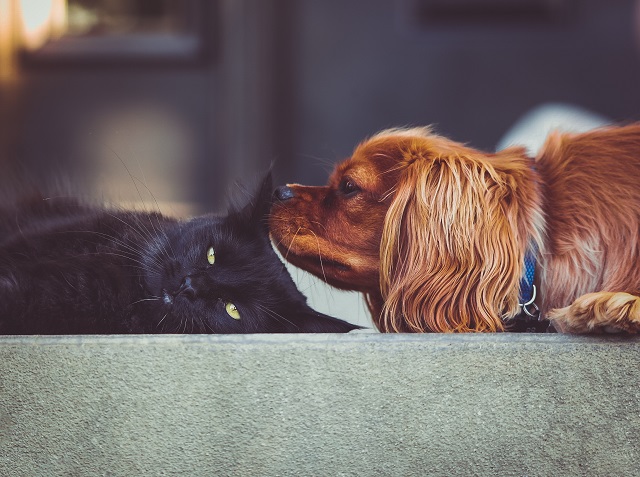It has been just over two years since I made one of the most difficult decisions of my life.
To this day, I still feel the sting of grief when I think of the moment I realized that it was time to euthanize my beloved cat.
I’d found her as a frail, sick kitten lost in a parking lot, and I’d taken her home where my mother and I—with the help of our extraordinary veterinarian and her team—nursed her back to health. She went on to live a rich, full life as my companion. I often joked that she was the longest, most stable, and definitely the most loving relationship I’d ever had.
There is no question that I loved my cat, that I considered her a family member, and that I was committed to providing her with the best quality of life that I could. When she became frail with age, and her health began to rapidly decline, I knew it was time for me to question my commitment. What did “best quality of life” truly mean? How did that define my role in the way she would pass from this life to the next?
Putting an animal to sleep is a deeply personal decision—one that we will most likely second guess. It is normal to feel guilt during our period of grief, wondering if we could have or should have done something differently. This is a part of how we work through our pain.
Some people believe that companion animal euthanasia is the wrong decision. They feel that pets need to live out their earthly experience completely, without having it cut short by human interference. There are others who believe that killing animals in any capacity is always wrong, no matter the circumstance, and these points of view can be confusing and harmful to a person who has recently lost his or her pet.
If you have recently made the choice to euthanize your pet, you are still a good person, and you did nothing wrong.
A large part of our guilt in these situations is due to thinking of decisions as “right” or “wrong.” We live in a society that polarizes and moralizes everything, and reality isn’t so black and white. There are many possible choices and outcomes.
Throughout our lives, we must make difficult and complicated decisions, and we do the best we can with the knowledge we have at the time. Our choices are generally not a reflection of how right or wrong (or good or bad) we are.
When guided by genuine love and compassion, we cannot make a “wrong” decision, regardless of how others may judge us.
This is especially true when it comes to how we care for our pets at the end of their lives.
Unlike human euthanasia, our pets cannot tell us their choice, so we must make that decision on their behalf. This can leave us feeling unsure if the time was truly right. Should we have waited? Was there something else that could have been done to make them well?
I know that in my case, I was fairly stubborn about this, because I didn’t want to feel like I was giving up on my friend. I didn’t want to fail her, but it soon became apparent that my cat was suffering, that treatment wasn’t working, and that her spirit was rapidly fading. My vet reassured me that I really had done all I could, and that forcing her to go on would have been more for my benefit than hers. I had to let her go.
Our pets teach us many important lessons. They show us unconditional love. They teach us to care for another living creature, and if we are very lucky, they will also show us how to let go. This is a hard lesson, but be grateful to their beautiful little spirits for loving us enough to give us that experience.
In our sadness after losing a pet, we tend to focus more on their death than their life. Incidentally, we often do the same thing with humans. We think about the most recent experience—which is, sadly, the pet’s passing—and we feel sorrow thinking about their pain or their suffering.
We may beat ourselves up with guilt if there was an accident or if we didn’t have enough money to cover the cost of expensive treatments that might have extended their lives. In our minds, we picture the animal we loved at the end, instead of at the other stages of their life.
It’s okay—and again, this is a normal part of grief, but it can be an enormous consolation if we can switch those thoughts to positive memories. This helped me so much. I remember my cat not as elderly and incontinent or having trouble breathing, but as a kitten. I thought about all the wonderful times we spent cuddling, playing, even having “conversations,” and these thoughts warm my heart.
I realized that her time had come, and that I did not “kill” her. I aided her through her passage—but more importantly, I rescued her when she was abandoned.
I shared almost 15 years of love with her, and I am confident that I gave her the best possible life—one where she was truly cherished. You did the same with your companion animal.
If you have recently lost a pet, I wish you comfort in this difficult time.
You did not make a wrong or bad decision if you put your friend to sleep. You mercifully, humanely guided them through their transition and spared them pain. This is an act of selfless kindness.
Know in your heart that their animal soul is grateful to you for the love, care, and respect you showed them in all stages of their life.
~
Author: Victoria Fedden
Image: Unsplash/Andrew Branch
Editor: Yoli Ramazzina
Supervising Editor 1: Danielle Beutell
Supervising Editor 2: Catherine Monkman

 Share on bsky
Share on bsky







Read 4 comments and reply